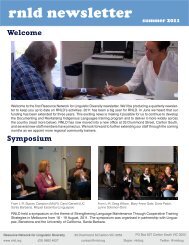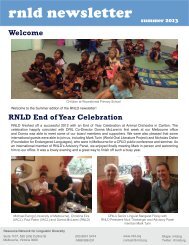The ethnography of language and language ... - Linguistics
The ethnography of language and language ... - Linguistics
The ethnography of language and language ... - Linguistics
You also want an ePaper? Increase the reach of your titles
YUMPU automatically turns print PDFs into web optimized ePapers that Google loves.
126 Jane H. Hill<br />
anything that would be in violation <strong>of</strong> ritual prohibitions. Arrangements<br />
were made to distribute dictionaries free to schools <strong>and</strong> at a greatly reduced<br />
price to Hopis, <strong>and</strong> all royalties were to be paid to the Hopi Foundation, a<br />
non-pr<strong>of</strong>it foundation dedicated to Hopi education. However, when the<br />
publication date <strong>of</strong> the dictionary neared, the University <strong>of</strong> Arizona Press<br />
proudly published a h<strong>and</strong>some full-color brochure as an announcement <strong>of</strong><br />
this major work, in which a price <strong>of</strong> $80.00 for the volume was mentioned.<br />
This announcement finally made public <strong>and</strong> unavoidable what everyone<br />
had managed to keep in the background – that the dictionary, which had<br />
been largely funded by money from the U.S. government’s National Endowment<br />
for the Humanities, would be available to non-Hopis, <strong>and</strong> that it would<br />
be sold. This precipitated a difficult year during which the Hopi Director <strong>of</strong><br />
Cultural Affairs, Lee Kuwanwisiwma, supported by many other Hopis, argued<br />
that the dictionary should not be published at all because the Hopi<br />
<strong>language</strong> should not be bought <strong>and</strong> sold, <strong>and</strong> certainly not for the benefit <strong>of</strong><br />
non-Hopis. Eventually the political faction that supported the dictionary<br />
prevailed <strong>and</strong> it was published, but this result was by no means guaranteed<br />
(Hill 2002 discusses this episode).<br />
Recent theoretical work on linguistic ideologies can help us to underst<strong>and</strong><br />
this sort <strong>of</strong> episode, <strong>and</strong> perhaps to work better <strong>and</strong> more comprehendingly<br />
with community members who support documentation <strong>of</strong> their<br />
heritage <strong>language</strong> in dictionaries <strong>and</strong> development projects like <strong>language</strong><br />
classes. Susan Gal <strong>and</strong> Judith Irvine (1995) showed that <strong>language</strong> ideologies<br />
nearly always invoke three major semiotic principles. <strong>The</strong>se are “iconization,”<br />
“recursiveness,” <strong>and</strong> “erasure.” In “iconization,” elements <strong>of</strong><br />
<strong>language</strong> are shaped to match elements “in the world” – <strong>and</strong> by erasure, any<br />
dimension <strong>of</strong> <strong>language</strong> that does not conform is ignored. By “recursiveness,”<br />
“iconization” operates throughout the system, bringing elements at<br />
every level into line. Michael Silverstein (1996, 2003) has pointed out the<br />
operation <strong>of</strong> what he calls the “dialectic <strong>of</strong> indexicality,” by which indexicality<br />
is reshaped as reference. Miyako Inoue (2004) has shown how certain<br />
kinds <strong>of</strong> social circumstances – episodes <strong>of</strong> rapid political economic<br />
change, in which identities are being rapidly restructured – heighten the<br />
rapidity <strong>and</strong> strength <strong>of</strong> these processes.<br />
Using these theoretical tools, we can say something about the Hopi case,<br />
in which a <strong>language</strong> <strong>and</strong> an associated way <strong>of</strong> life that had always been<br />
taken for granted becomesthe object <strong>of</strong> the most acute attention <strong>and</strong> reflection.<br />
Such attention <strong>and</strong> reflection, <strong>and</strong> the iconization principle, yields an<br />
exaggerated purism. In the Hopi case, by iconization the Hopi community





